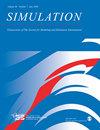The airflow distribution and aerosol diffusion rules in the negative pressure isolation ward
IF 2
4区 工程技术
Q4 COMPUTER SCIENCE, INTERDISCIPLINARY APPLICATIONS
Simulation-Transactions of the Society for Modeling and Simulation International
Pub Date : 2023-04-26
DOI:10.1177/00375497231168628
引用次数: 1
Abstract
Negative pressure wards are significant in preventing the spread of infectious pathogens which play a crucial role in fighting against COVID-19. Owing to the negative pressure, contaminated air with pathogens is not able to flow from the wards to non-contaminated zones while fresh filtered air will be transported to the ward via the ventilation system. As airflow controlled by ventilation systems affects the motion of pathogens, for example, infectious aerosol particles, the ability of a negative pressure ward to reduce the risk of infection highly relies on an effective ventilation system. In this investigation, impacts of airflow patterns under various human postures and ventilation processes aerosols diffusion are analyzed via the computational fluid dynamics (CFD) simulation. According to the results, among three airflow patterns, the highest contaminant removal efficiency is 57% at 200 s with the top supply and bottom return mode; besides, in three postures, in the case that the patient is in a standing position, the contaminant removal efficiency is the highest. Furthermore, it is found that the best airflow scheme is a slit tuyere in the ward, with a top supply and side return mode and a sitting position for the patient. This study may provide a reference for the design of airflow in negative pressure isolation wards, control of contaminants, and prevention of viral infections, so as to ensure a good working and recovery environment for medical staff and patients.负压隔离病房内气流分布及气溶胶扩散规律
负压病房在预防传染性病原体传播方面具有重要意义,在抗击新冠肺炎疫情中发挥着至关重要的作用。由于负压,带有病原体的污染空气不能从病房流向非污染区,而经过过滤的新鲜空气将通过通风系统输送到病房。由于通风系统控制的气流会影响病原体(例如传染性气溶胶颗粒)的运动,因此负压病房降低感染风险的能力高度依赖于有效的通风系统。本研究通过计算流体动力学(CFD)模拟,分析了不同人体姿势和通风过程下气流模式对气溶胶扩散的影响。结果表明,三种气流方式中,上送风下回风在200 s时的污染物去除效率最高,达到57%;此外,在三种体位中,当患者处于站立姿势时,污染物去除效率最高。此外,发现最佳的气流方案是病房内的狭缝风口,采用顶进侧回模式,患者采用坐姿。本研究可为负压隔离病房的气流设计、污染物控制、病毒感染预防提供参考,为医护人员和患者提供良好的工作和康复环境。
本文章由计算机程序翻译,如有差异,请以英文原文为准。
求助全文
约1分钟内获得全文
求助全文
来源期刊
CiteScore
3.50
自引率
31.20%
发文量
60
审稿时长
3 months
期刊介绍:
SIMULATION is a peer-reviewed journal, which covers subjects including the modelling and simulation of: computer networking and communications, high performance computers, real-time systems, mobile and intelligent agents, simulation software, and language design, system engineering and design, aerospace, traffic systems, microelectronics, robotics, mechatronics, and air traffic and chemistry, physics, biology, medicine, biomedicine, sociology, and cognition.

 求助内容:
求助内容: 应助结果提醒方式:
应助结果提醒方式:


